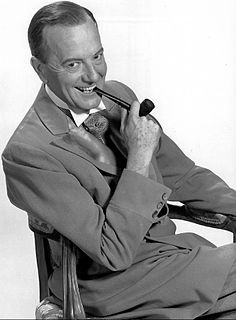
Maurice Herbert Evans was a British actor, noted for his interpretations of Shakespearean characters. His best-known screen roles are Dr. Zaius in the 1968 film Planet of the Apes and as Samantha Stephens's father, Maurice, on Bewitched.
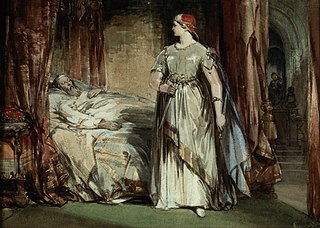
Lady Macbeth is a leading character in William Shakespeare's tragedy Macbeth (c.1603–1607). The wife of the play's tragic hero, Macbeth, Lady Macbeth goads her husband into committing regicide, after which she becomes queen of Scotland. Later, however, she suffers pangs of guilt for her part in the crime, which drives her to sleepwalk. She dies off-stage in the last act, an apparent suicide.

Imogen is the daughter of King Cymbeline in Shakespeare's play Cymbeline. She was described by William Hazlitt as "perhaps the most tender and the most artless" of all Shakespeare's women.
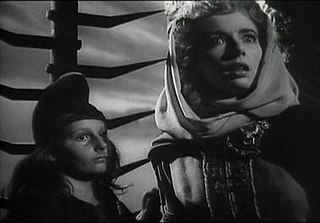
Macduff's son is a character in William Shakespeare's tragedy Macbeth (1606). His name and age are not established in the text, however he is estimated to be 7–10 years of age, and is often named as Andrew, for ease. He follows Shakespeare's typical child character; cute and clever. While Lady Macduff and her children are mentioned in Holinshed's Chronicles as the innocent victims of Macbeth's cruelty, Shakespeare is completely responsible for developing Macduff's son as a character.
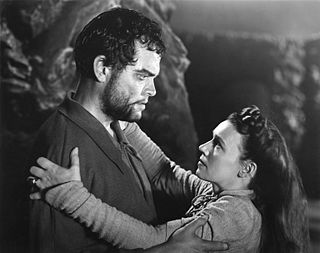
Lord Macbeth, the Thane of Glamis, is the title character and titular main protagonist turned primary antagonist of William Shakespeare's Macbeth. The character is based on the historical king Macbeth of Scotland, and is derived largely from the account in Holinshed's Chronicles (1587), a history of Britain.
William Shakespeare's Macbeth has been screened numerous times, featuring many of the biggest names from stage, film, and television.

The Three Witches, also known as the Weird Sisters or Wayward Sisters, are characters in William Shakespeare's play Macbeth. They hold a striking resemblance to the three Fates of classical mythology, and are, perhaps, intended as a twisted version of the white-robed incarnations of destiny. The witches eventually lead Macbeth to his demise. Their origin lies in Holinshed's Chronicles (1587), a history of England, Scotland and Ireland. Other possible sources, aside from Shakespeare's imagination, include British folklore, such contemporary treatises on witchcraft as King James VI of Scotland's Daemonologie, the Norns of Norse mythology, and ancient classical myths of the Fates: the Greek Moirai and the Roman Parcae. Productions of Macbeth began incorporating portions of Thomas Middleton's contemporaneous play The Witchcirca 1618, two years after Shakespeare's death.
Sheila Allen was an English actress, who was best known to the wider public for her role on television as Cassie Manson in Bouquet Of Barbed Wire and its sequel Another Bouquet (1976–77). From 1966 to 1978, Allen was a member of the Royal Shakespeare Company.
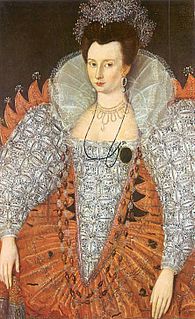
The Dark Lady of the Sonnets is a 1910 short comedy by George Bernard Shaw in which William Shakespeare, intending to meet the "Dark Lady", accidentally encounters Queen Elizabeth I and attempts to persuade her to create a national theatre. The play was written as part of a campaign to create a "Shakespeare National Theatre" by 1916.

Shakes versus Shav (1949) is a puppet play written by George Bernard Shaw. It was Shaw's last completed dramatic work. The play runs for 10 minutes in performance and comprises a comic argument between Shaw and Shakespeare, with the two playwrights bickering about who is the better writer as a form of intellectual equivalent of Punch and Judy.

The sleepwalking scene is a critically celebrated scene from William Shakespeare's tragedy Macbeth (1606). The first scene in the tragedy's 5th act, the sleepwalking scene is written principally in prose, and follows the guilt-wracked, sleepwalking Lady Macbeth as she recollects horrific images and impressions from her past. The scene is Lady Macbeth's last on-stage appearance, though her death is reported later in the act. Well known phrases from the scene include "Out, damned spot!" and "All the perfumes of Arabia will not sweeten this little hand." The British tragedienne Sarah Siddons (1755–1831) was distinguished for her performance and interpretation of the scene.

Louis James Calvert was a British stage and early film actor of the late 19th and early 20th centuries and an actor-manager. He is perhaps best remembered today for having created roles in plays by George Bernard Shaw and for appearing in King John (1899), the earliest known example of any film based on Shakespeare,

Annajanska, the Bolshevik Empress: A Revolutionary Romancelet is a one-act play by George Bernard Shaw, written in 1917.

Cymbeline Refinished (1937) is a play-fragment by George Bernard Shaw in which he writes a new final act to Shakespeare's play Cymbeline. The drama follows from Shaw's longstanding need to reimagine Shakespeare's work, epitomised by his play Caesar and Cleopatra and his late squib Shakes versus Shav.

Jitta's Atonement (1923) is an adaptation by George Bernard Shaw of the play Frau Gitta's Sühne by Siegfried Trebitsch. It is about a woman who has to atone to her husband for having an affair with his best friend. The atonement of both Jitta and other characters take unexpected forms. Shaw dramatically rewrote the last part of the play, giving it a more characteristically Shavian tone.

The Music Cure, a Piece of Utter Nonsense (1913) is a short comedy sketch by George Bernard Shaw, satirising therapeutic fads of the era and the Marconi scandal of 1912.

The Fascinating Foundling (1909) is a short comic play by George Bernard Shaw. Shaw classified it as one of his "tomfooleries". He was so unimpressed with his own work that the published text was humorously subtitled "a Disgrace to the Author".

Audrey Hare Bicker-Caarten (1900-1977) was an actress and playwright working under the name of Audrey Carten.
















